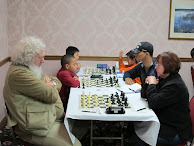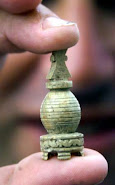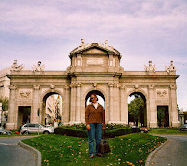Tuesday, August 28, 2007
Archaeological Blinders
This kind of story seems innocent enough - at first glance. But really, it's quite subversive - I'll tell you why I think so after the article:
From the Columbus Dispatch Online
Ancient lifestyle may link art found in Egypt, Europe
Tuesday, August 28, 2007 3:31 AM
By Bradley T. Lepper
National Geographic News reported last month that an international team of archaeologists had discovered the oldest known art in Egypt. The country is, of course, known for its pyramids and mummies, but the art in question is 10,000 years older than the dawn of Egyptian civilization.
The art consists of petroglyphs, or engravings on stone, estimated to be 15,000 years old. Its style is closer to the art of Paleolithic France than to that of Pharonic Egypt.
The National Geographic report quoted Dirk Huyge, a curator at the Royal Museums of Art and History in Brussels, Belgium, as saying, "It is not at all an exaggeration to call it 'Lascaux on the Nile,' " referring to the most famous French cave art site.
Huyge is not suggesting any direct connection between Paleolithic France and Egypt. Instead, he said the similarities in the art likely occurred because the artists shared a common way of life.
"When people are confronted with similar conditions, this will automatically lead to a similar kind of thinking, a similar creativity."
Huyge's point is well-taken and has broad applicability.
For example, Stonehenge and the geometric earthworks of the Hopewell culture both have been found to encode an intricate series of astronomical alignments in their architecture.
They also both used parallel-walled avenues to define sacred pathways, and both seem to have been places of pilgrimage.
Is this evidence for contact between ancient Ohio and Neolithic England, more than 1,000 years before Columbus?
Mary Borgia, a teacher from Newark who has visited Stonehenge on a Fulbright fellowship, offered this explanation in an article published last year in The Advocate of Newark: "There seems to be a common need to harness and understand the heavens, possibly the need to honor the community's gods/goddesses/spirits by displaying celestial knowledge through the construction of grand architectural monuments."
Huyge and Borgia are right. We share a common humanity, so our cultural expressions are bound to share some important elements -- regardless of where, or when, we live.
Bradley T. Lepper is curator of archaeology at the Ohio Historical Society.
******************************************************************************************
Huyge is not suggesting any direct connection between Paleolithic France and Egypt. Instead, he said the similarities in the art likely occurred because the artists shared a common way of life.
Stonehenge and the geometric earthworks of the Hopewell culture both have been found to encode an intricate series of astronomical alignments in their architecture. Is this evidence for contact between ancient Ohio and Neolithic England, more than 1,000 years before Columbus? [Implied answer - of course not!]
Notice the unspoken assumption that underlies this article - that ancient man COULD NOT HAVE TRAVELED from one place to another so as to trade, interact, inter-marry, make war, share knowledge, adopt parts of each other's cultures, etc.
However, we know that assumption to be totally false!
First, from the time man first appeared on Earth, they walked, floated on logs and rafts, boated and later rode on all kinds of animals and vehicles from one place to another. The latest generally accepted evidence is that man arrived in the Americas at least 20,000 years old - but there is evidence out east that may speak to man's presence some 50,000 years ago.
Second, we know that in a wide ark of the ancient Middle East, along the Mediterranean (and later outside the "Pillars of Hercules to include Ireland and England), in Central Asia, China, and in Europe, there were extensive trading networks going back thousands of years. Every day new evidence of trade is discovered in excavations of ancient household foundations and newly-discovered tombs.
Why would anyone automatically assume that the arrival of man in the New World was a one-time thing, never to be repeated, when ancient man continually demonstrated that he had the ability and the willingness to go ever exploring across oceans and great land-masses? Who's to say that man didn't travel back and forth from the Old World to the New - repeatedly? We know man arrived in the New World in several waves over thousands of years - some over land (via the Bering Strait land bridge) and some by sea - from both the east and the west!
The archaeological record still has much to teach us - as we every day are learning. Already existing evidence is constantly being re-evaluated in light of new science and techniques to discover the secrets of ancient artifacts. And we don't know what the next new dig may reveal to us about our past. Of course, there are those who are frightened to poke at academia's sacred cows - and archaeologists, paleotologists, and anthropologists are no exception to this rule. However, I find it intellectually dishonest in the extreme for ANYONE to tell me that I cannot imagine a global network of people back in ancient times, and incredibly arrogant to imply that if I think so, then I am sadly misinformed at best (ah, they say, another victim of "popular internet science"), and pathetically silly (and stupid) at worst.
I'll take the abuse - I'm used to it. In the interests of true scientific inquiry, I prefer to reserve making judgments about ancient trade and contacts between ancient civilizations, Old World and New World, as long as I know that the full story isn't known - and perhaps may never be know (not within my lifetime, in any event). I prefer, instead, to offer conjecture and fantastical notions that "The Establishment" finds silly (oh, that sounds so "Sixties", doesn't it, LOL!), and have a rip-roaring good time doing so.
I'll by-pass such subversive attempts to channel my thinking into "acceptable" paths, thank you very much :)
Subscribe to:
Post Comments (Atom)



































1 comment:
The truth is that scientists and academics spend more time defending dogma than they do trying to factor in the "anomalies" that prove them wrong. It's the opposite of empiricism, which is ironic in the extreme. Academia and Science are often the filters for patriarchal rule. They tell you what you should know, if you differ in your knowledge you are a crank or a nut or otherwise dangerous to the power structure. That last part is true, of course, because truly educated people won't sit still for the bullshit shoveled by the owners of our society. The last thing they want is people thinking for themselves and doing their own research. Fortunately, some of us do just that, and if we find something that doesn't fit, we try to figure out why.
The basis for this ridiculousness is that they want us to think that the Abrahamic religions were the beginning of culture - that the world before was crude and barbaric until the prophet du jour showed us the way. It was, in fact, the END of civilization and the beginning of 6,000 years of an unnatural social order that has cut us off from ourselves, each other and Gaia.
So much of what kids learn is lies - Columbus was the last explorer to visit America, not the first. There were many democracies functioning in the Americas before the Europeans decided to move in on us and those governments were primarily peaceful and matriarchal. We know this because some of them still exist in spite of 300 years of methodical genocide.
How much information was destroyed by the "church"? Almost as much as we have now. We can't build a pyramid right now that would be the equivalent of the one at Giza. With the exception of the computer chip, pretty much all of our technology, from plumbing to precise astronomical calculations, was available at the Library of Alexandria. We're just now digging our way out of the Dark Ages brought to us by the ambitions of the "vampire elite" that profit from keeping people poor, stupid and afraid.
Internet science is about the only science worth believing - that's why they want so desperately to control it. Information is power and the people now have access to power in a way unknown in modern times. I just hope we make the most of it while we can.
Post a Comment